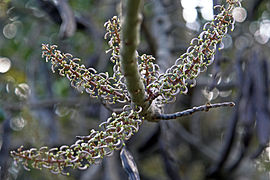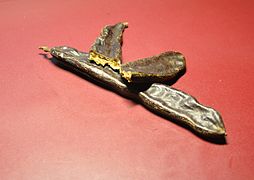Ceratonia
| Ceratonia | |
|---|---|

| |
| Carob tree (Ceratonia siliqua) | |
| Scientific classification | |
| Kingdom: | Plantae |
| Clade: | Tracheophytes |
| Clade: | Angiosperms |
| Clade: | Eudicots |
| Clade: | Rosids |
| Order: | Fabales |
| Family: | Fabaceae |
| Subfamily: | Caesalpinioideae |
| Genus: | Ceratonia L. |
| Species | |
|
Selected species | |
Ceratonia is small genus of flowering trees in the pea family, Fabaceae, endemic to the Mediterranean region and the Middle East. Its best known member, the carob tree, is cultivated for its fruits (called pods) and has been widely introduced to regions with similar climates.
It belongs to the subfamily Caesalpinioideae.[1]
The genus was created by Carl Linnaeus and published in Species Plantarum 2: 1026 en 1753.[2][3] The type specimen is Ceratonia siliqua.
The genus was long considered monotypic (with only one species), but a second species, Ceratonia oreothauma, was identified in 1979 from Oman and Somalia.[4]
Images[change | change source]
Some photos of Ceratonia siliqua (the carob tree):
-
Tree
-
Flowers
-
Fruit
References[change | change source]
- ↑ "Ceratonia L." Germplasm Resources Information Network. United States Department of Agriculture. 3 April 2007. Archived from the original on 23 September 2015. Retrieved 8 August 2016.
- ↑ "'Ceratonia". Tropicos.org. Missouri Botanical Garden. Retrieved 8 August 2016.
- ↑ "Ceratonia in PlantList". Archived from the original on 2013-09-29. Retrieved 2016-08-09.
- ↑ "Ceratonia oreothauma". Kew Bulletin Vol. 35, No. 2. 1980. Retrieved 8 August 2016.
{{cite web}}: Cite uses deprecated parameter|authors=(help)
Other websites[change | change source]
 Media related to Ceratonia at Wikimedia Commons
Media related to Ceratonia at Wikimedia Commons Data related to Ceratonia at Wikispecies
Data related to Ceratonia at Wikispecies- Ceratonia in Encyclopedia of Life
- Ceratonia L. in Global Biodiversity Information Facility



